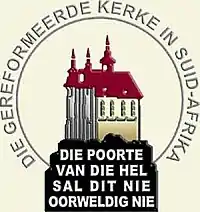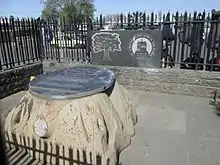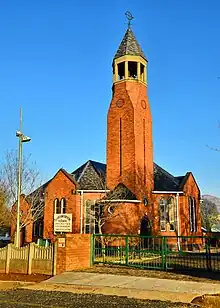Reformed Churches in South Africa
The Reformed Churches in South Africa (Afrikaans: Gereformeerde Kerke in Suid-Afrika) is a Christian denomination in South Africa that was formed in 1859 in Rustenburg. Members of the church are sometimes referred to as Doppers.[4]
| Reformed Churches in South Africa | |
|---|---|
 | |
| Abbreviation | GKSA |
| Classification | Protestant |
| Orientation | Reformed |
| Theology | Calvinist[1] |
| Polity | Presbyterian |
| Associations | International Conference of Reformed Churches, World Reformed Fellowship |
| Region | South Africa, Namibia, Botswana, Zambia, Zimbabwe, India |
| Origin | 1859 Rustenburg |
| Separated from | Dutch Reformed Church in South Africa (NHK) |
| Congregations | 397[2] |
| Members | 100,000[3] |
| Ministers | 276 |
| Official website | gksa |
History of the Gereformeerde Kerke in South Africa

In the early 19th century a new hymnbook was introduced in the Dutch churches in the Netherlands, which was implemented in the Dutch Reformed Church in the Cape Colony. Many of these songs contradicted the teachings of the three confessions accepted at the Synod of Dort in 1618/1619 (The Heidelberg Catechism, the Belgic Confession and the Canons of Dort). Some of the church members could not accept these doctrines. When they refused to sing the hymns, they were threatened with excommunication. They held the view: In Gods huis Gods lied (In God's house God's songs).[5]
The main founders of the denomination were particularly concentrated in the vicinity of Rustenburg, in the Transvaal. In 1859, 15 brothers decided to separate themselves from the Dutch Reformed Church. These 15 members held a meeting on 10 February 1859 under a seringboom at Rustenburg. At this meeting, 300 members enrolled as members of Gereformeerde Kerke.[6] The spot is marked today by the Syringa Tree Monument.
The Gereformeerde Kerke founded a seminary for theological studies and teacher training in Burgersdorp in the Eastern Cape. It was moved to Potchefstroom in the early 20th century, where it became the Potchefstroom University College for Higher Christian Education, now the North West University. One of the faculties is the seminary for training their ministers.
The Gereformeerde Kerke today
The official name of the church body today is Die Gereformeerde Kerke in Suid-Afrika (GKSA), translated into English as the Reformed Churches in South Africa (RCSA). It has 415 Congregations ministering to people in all 11 official languages of South Africa.[7] There are congregations in Zimbabwe, Namibia and Lesotho.
The General Synod meets every third year in Potchefstroom.
It has ecumenical ties with churches on all the continents of the world, except Antarctica.
Songbook of Gereformeerde Kerke
The Gereformeerde Kerke today uses only hymns from the Bible: the Psalms as well as Skrifberymings. Skrifberymings are hymns based on passages from the Bible.
Besides the Psalms and Skrifberymings, the hymnal contains the following:
- Three Forms of Unity, which consist of the Belgic Confession, the Heidelberg Catechism and the Canons of Dort.[8]
- The liturgical forms for the baptism of children, public confession of faith, the baptism of adults, the holy communion, confirmation of elders and deacons, confirmation of ministers, and the marriage ceremony.
- The Church Order[9]
- A number of prayers.
Theology

Church government
The Reformed Churches have a Presbyterian – Synodal system of church government.[12] The church consists of the Eastern Regional Synod, the Bushweld Synod, the Northwest Synod, the Regional Synod of Free State and KwaZulu-Natal, the Southern Regional Synod, and the Randvaal Regional Synod.[13]
Seminary
The Reformed Churches in South Africa have their own Theological Seminary " Die Teologiese Skool"[14] in Potchefstroom.[7]
Missions
The Reformed Churches in South Africa has a number of growing local congregations. The denomination has local outreaches in Botswana and Mozambique. There are churches that support missionaries in Burundi. The Reformed Church in Rustenburg, South Africa has agreement with Koshin Presbyterian Church in Korea to support evangelism, and establishing new multicultural churches in Rustenburg area. The church cooperates with the Presbyterian Church of Brazil in missions in Angola and Mozambique. It is also involved in a Reformed church plant in Hanoi, Vietnam. Through membership in the World Reformed Fellowship, Gereformeerde Gemeenten collabotates WRF's works, also for example in the International Institute of Islamic Studies.[15]
Relations with other Reformed churches
Reformed Churches in South Africa is a member of the World Reformed Fellowship[16] and the International Conference of Reformed Churches[17]
The Gereformeerde Kerke has sister church relationship with the :
- Christian Reformed Churches in the Netherlands
- Reformed Churches in the Netherlands (Liberated)
- Netherlands Reformed Churches
- Reformed Churches in Botswana
- United Reformed Church in Congo
- Christian Reformed Church in North America
- Orthodox Presbyterian Church
- Christian Reformed Churches of Australia
- Free Church of Scotland
- Reformed Churches of New Zealand
- Reformed Church in Japan
- Presbyterian Church in Korea (Koshin).[18][19]
- General Assembly of the Presbyterian Church of the Philippines
- National Capital Region Presbytery of the Presbyterian Church of the Philippines
Footnotes
- "South African Christian". Sachristian.co.za.
- "Wie is ons?". Archived from the original on 15 June 2013. Retrieved 5 May 2013.
- "Statistiek". gksa1.businesscatalyst.com. Archived from the original on 1 April 2014. Retrieved 3 February 2022.
- Pettman, Charles (1913). Africanderisms; a glossary of South African colloquial words and phrases and of place and other names. Longmans, Green and Co. p. 151.
- Fasse, Christoph. "Address data base of Reformed churches and institutions". Reformiert-online.net.
- "Geskiedenis". Archived from the original on 27 July 2013. Retrieved 28 July 2013.
- "BBK.GKV » Zuid-Afrika". Bbk.gkv.nl.
- "Geloofsbelydenisse / Confessions - GKSA". Archived from the original on 7 April 2013. Retrieved 28 March 2013.
- "Church Order of the Reformed Churches in South Africa". Archived from the original on 16 June 2013.
- "English documents". Archived from the original on 14 June 2013. Retrieved 5 May 2013.
- "Belydenisskrifte". gksa1.businesscatalyst.com. Archived from the original on 16 June 2013. Retrieved 3 February 2022.
- "Kerkregering". gksa1.businesscatalyst.com. Archived from the original on 16 June 2013. Retrieved 3 February 2022.
- "Statistiek". Archived from the original on 25 December 2013. Retrieved 29 May 2013.
- "Die Teologiese Skool". Archived from the original on 7 October 2003. Retrieved 28 March 2013.
- "Sending". Archived from the original on 16 June 2013.
- "The World Reformed Fellowship – Membership List". 30 July 2012. Archived from the original on 30 July 2012. Retrieved 18 April 2019.
- "The International Conference of Reformed Churches". 17 July 2012. Archived from the original on 17 July 2012. Retrieved 18 April 2019.
- "Ekumeniese Bande - GKSA". Archived from the original on 7 April 2013. Retrieved 28 March 2013.
- "GKSA Bande". gksa1.businesscatalyst.com. Archived from the original on 16 June 2013. Retrieved 3 February 2022.
References
- "Professor Dirk Postma (1818–1890)", Dr. G.C.P. van der Vyver, Pro Rege Pers, 1958
- "Handleiding vir die studie van Kerkgeskiedenis" (Guide for the Study of Church History), Prof. S. du Toit, Pro Rege Pers, 1970